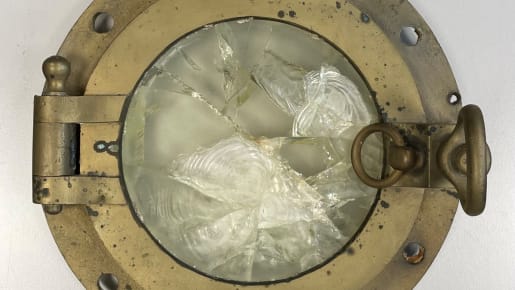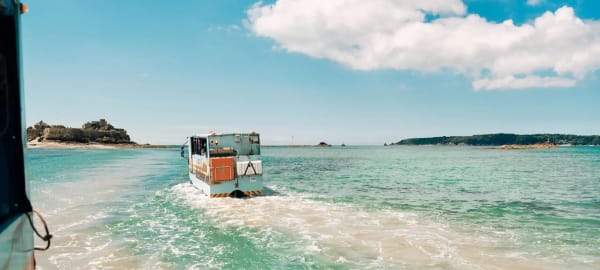
The PS Normandy was a British paddle-wheel steam ship built in 1863
PS Normandy porthole
The PS Normandy was a British paddle-wheel steam ship built in 1863, operated by the Steam Packet Company (part of the London & South-West Railway Co.), and was seen as one of the finest of their fleet. Its usual route was from Southampton to Guernsey and Jersey, ferrying mail from the mainland and back.
On the evening of 16th March 1870, PS Normandy had embarked on its journey from Southampton back to St. Peter Port, and onwards to Jersey. The Captain was Henry Beckford Harvey and the ship was carrying 28 crew and 31 passengers. Travelling along a different route, but in the same area, was the steamship SS Mary (of the more powerful propeller type steamship), commanded by Captain Stranack. Mary was carrying 500 tons of corn from Odessa, Ukraine to London, weighing a considerable amount more than the Normandy.
It was on this night that fog began to roll into the channel. With the Normandy heading southbound towards Jersey, and the Mary bearing northward towards the mainland, the coincidence of their paths crossing was next to none. However, as the Normandy was travelling under a clear sky, the Mary was making its way under the guise of a thick bank of fog. Despite both vessels making use of their foghorns and lights, it wasn’t until it was too late that either side noticed each other. At around three in the morning, despite a last-minute attempt to change course, the Normandy crossed exactly perpendicular to the Mary. Though only travelling at two knots, due to the angle and significant load, the bow of the Mary thrust into the starboard side paddle of the Normandy, breaching the hull, allowing water to rush in. The starboard lifeboat was also lost.
As the vessel was taking on more water, Captain Harvey initiated what would become a notable display of heroism and gallantry, ordering all women and children to board the remaining lifeboats, whilst the men stood back. Although calls were made to the Mary to send all available lifeboats, on fear that his vessel was too damaged, Captain Stranack sent only one lifeboat, which eventually turned back before reaching the Normandy. A quote from one of the surviving passengers, published in ‘The Annual Register: A Review of Public events at Home and Abroad, 1870’, perfectly captures the actions of Captain Harvey – ‘The Captain behaved with the greatest coolness and judgement under such trying circumstances. During the whole occurrence extraordinary order and quietness prevailed, and the greatest fortitude was shown. I last saw Captain Harvey on the bridge, giving orders for the management of the boats and engines.’ The number of lives lost counted to thirty-four, but would have far surpassed if not for Harvey’s actions.
So much so, the events that occurred that night caught the interest of Victor Hugo (he had been on that same ship three years prior), who recorded the events from a first-hand account of a passenger, in ‘Actes et Paroles, Ce que c’est que l’exil’, 1875. He writes ‘Harvey, impassive in his position as captain, commanded, dominated, directed, took care of everything and everyone, calmly governed this anguish, and seemed to give disaster orders. It was as if the shipwreck obeyed him.’
At the 20th minute after the collision, Hugo writes ‘Captain Harvey, standing on the bridge, made no movement, did not say a word, and entered the abyss motionless. We saw, through the sinister mist, this black statue sinking into the sea’.
Jersey Heritage acquired this porthole as a donation from the Receiver of Wreck, Maritime & Coastguard Agency, after a diver identified the wreck of the PS Normandy near the Needles, Isle of Wight, and brought up a number of portholes.
There are now two memorials that commemorate the loss of lives on that disastrous night; the Harvey Memorial, dedicated to the crew, and the Westaway Memorial, both of which can be found at the bottom of La Collette Hill. The Westaway memorial is a tribute to John Nathaniel Westaway, a passenger who gave up his place on a lifeboat in place of a Miss Albina Falle. When asked to join another boat, he simply said ‘No, I am in God’s hands.’

PS Normandy Porthole




